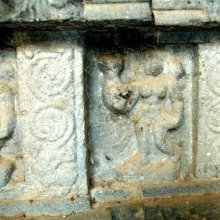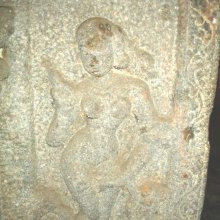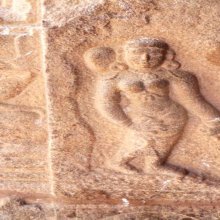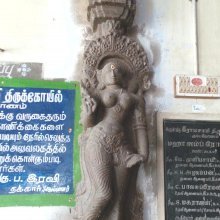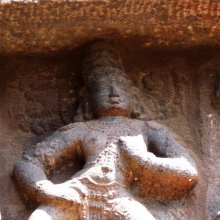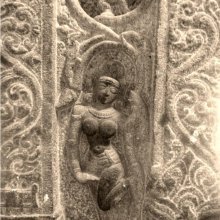Valana, Valanā, Valaṉā: 19 definitions
Introduction:
Valana means something in Hinduism, Sanskrit, Marathi, Jainism, Prakrit, Hindi, Tamil. If you want to know the exact meaning, history, etymology or English translation of this term then check out the descriptions on this page. Add your comment or reference to a book if you want to contribute to this summary article.
Alternative spellings of this word include Valan.
Images (photo gallery)
(+15 more images available)
In Hinduism
Natyashastra (theatrics and dramaturgy)
Source: Wisdom Library: Nāṭya-śāstra1) Valana (वलन, “turning”) refers to a specific gesture (āṅgika) made with the eyeballs (tārā), according to the Nāṭyaśāstra chapter 8. These gestures form a part of the histrionic representation (abhinaya).
2) Valana (वलन, “turning”) also refers to a specific gesture (āṅgika) made with the thighs (ūru), according to the Nāṭyaśāstra chapter 10. These gestures form a part of the histrionic representation (abhinaya).
Source: archive.org: Natya Shastra1) Valana (वलन, “turning”).—A type of gesture (āṅgika) made with the eyeballs (tārā);—Instructions: moving (the eyeballs) obliquely.. Uses: in the Heroic (vīra), the Furious (raudra) and the Terrible (bhayānaka) Sentiments (rasa).
2) Valana (वलन, “turning”).—A type of gesture (āṅgika) made with the thighs (ūru);—Instructions: drawing the knees inwards [while going]. Uses: in the movement of women at ease.

Natyashastra (नाट्यशास्त्र, nāṭyaśāstra) refers to both the ancient Indian tradition (shastra) of performing arts, (natya—theatrics, drama, dance, music), as well as the name of a Sanskrit work dealing with these subjects. It also teaches the rules for composing Dramatic plays (nataka), construction and performance of Theater, and Poetic works (kavya).
Chandas (prosody, study of Sanskrit metres)
Source: Shodhganga: a concise history of Sanskrit Chanda literatureValanā (वलना) is the alternative name of a Sanskrit metre (chandas) mentioned by Hemacandra (1088-1173 C.E.) in his auto-commentary on the second chapter of the Chandonuśāsana. Valanā corresponds to Latā. Hemacandra gives these alternative names for the metres by other authorities (like Bharata), even though the number of gaṇas or letters do not differ.

Chandas (छन्दस्) refers to Sanskrit prosody and represents one of the six Vedangas (auxiliary disciplines belonging to the study of the Vedas). The science of prosody (chandas-shastra) focusses on the study of the poetic meters such as the commonly known twenty-six metres mentioned by Pingalas.
Jyotisha (astronomy and astrology)
Source: Wisdom Library: Brihat Samhita by VarahamihiraValana (वलन) refers to the “angles”, according to the Bṛhatsaṃhitā (chapter 5), an encyclopedic Sanskrit work written by Varāhamihira mainly focusing on the science of ancient Indian astronomy astronomy (Jyotiṣa).—Accordingly, “The magnitude of the solar eclipse is determined by means of the moon’s parallax (in latitude); the points (on the disc) of the commencement and termination of the eclipse are determined by means of both parallax and angles [i.e., valana]; the times of the commencement and termination of the eclipse by means of the time of new moon”.
Source: Wikibooks (hi): Sanskrit Technical TermsValana (वलन).—(lit. deflection) valana relates to an eclipsed body. It is the angle subtended at the body by the arc joining the north point of the celestial horizon and the north pole of the ecliptic (i.e., the angle between the circle of position and the circle of celestial longitude of the eclipsed body). valana is generally divided into two components: 1. akṣavalana and 2. ayanavalana. The akṣavalana is the angle subtended at the body by the arc joining the north point of the celestial horizon and the north pole of the celestial equator (i.e., the angle between the circle of position and the hour circle of the eclipsed body). The ayanavalana is the angle subtended at the body by the arc joining the north poles of the equator and the ecliptic (i.e., the angle between the hour circle and the circle of celestial longitudes of the eclipsed body). The valana is also defined as follows: The Great circle of which the eclipsed body is the pole is called the horizon of the eclipsed body. Suppose that the prime vertical, equator and the ecliptic intersect the horizon of the eclipsed body at the points A, B, and C respectively, towards the east of the eclipsed body. the arc AB is called the akṣavalana, the arc BC is called ayanavalana, and the arc AC is called valana. valana is also called spaṣṭavalana. Note: Valana is a Sanskrit technical term used in ancient Indian sciences such as Astronomy, Mathematics and Geometry.

Jyotisha (ज्योतिष, jyotiṣa or jyotish) refers to ‘astronomy’ or “Vedic astrology” and represents the fifth of the six Vedangas (additional sciences to be studied along with the Vedas). Jyotisha concerns itself with the study and prediction of the movements of celestial bodies, in order to calculate the auspicious time for rituals and ceremonies.
Kavya (poetry)
Source: archive.org: Naisadhacarita of SriharsaValanā (वलना) refers to “moving” or “turning”, and is mentioned in the Naiṣadha-carita 3.118 (here making e.g. of pictorial designs, same as racanā, “patrāvalīnāṃ valanā”).—Cf. Brahmavaivartapurāṇa (Janmakhaṇḍa) 28.96; and Yogavāsiṣṭha (Utpattiprakaraṇa 28.39; 34.25)—“dhammillavalanā”. The word [valanā] is used in the sense of “movement” in Haravijāya 2.31—“nṛttavalanāmu; valanākulaṣaṭpadāḥ”, ibid. 3.47. Cf. in Yogavāsiṣṭha (Utpattiprakaraṇa 48.79).

Kavya (काव्य, kavya) refers to Sanskrit poetry, a popular ancient Indian tradition of literature. There have been many Sanskrit poets over the ages, hailing from ancient India and beyond. This topic includes mahakavya, or ‘epic poetry’ and natya, or ‘dramatic poetry’.
Languages of India and abroad
Marathi-English dictionary
Source: DDSA: The Molesworth Marathi and English Dictionaryvalana (वलन).—n S An angle formed at a heavenly body by two great circles. Disting. into āyanavalana, akṣajavalana, spaṣṭavalana q. v. in loc.
--- OR ---
vaḷaṇa (वळण).—f n (valana S) Outlines or lineaments; the form, figure, mould, make, cast of. 2 A turning or winding; a bend or curvature (of a road, a river): a bend or knee (of a mountain). Pr. vaḷaṇā- cēṃ pāṇī vaḷaṇānēñca jāīla As the twig is bent, the tree is inclined: or Things are sure to take their natural course. 3 Fashion or course; a line or mode of procedure. 4 Intercourse, intercommunication, conversancy or dealing with. Ex. sarakārānta vaḷaṇa bāndhāvēṃ maga phiryāda karāvī. 5 Disposition, propensity, bent or inclination (of the mind or affections). 6 Training, disciplining, managing. Ex. bāḷakāsa vaḷaṇānta ṭhēvāvēṃ. 7 A mound or bank raised to turn the course of a stream. Pr. pāṇyāadhīṃ vaḷaṇa bāndhāvēṃ. vaḷaṇāvara jāṇēṃ g. of o. To take after; to form one's self upon; to follow. vaḷaṇāvaḷaṇānēṃ nāva hākaṇēṃ -kāma karūna ghēṇēṃ -jāṇēṃ -cālaṇēṃ -vāgaṇēṃ &c. To conform to all the turnings and windings of.
Source: DDSA: The Aryabhusan school dictionary, Marathi-Englishvaḷaṇa (वळण).—f n Outlines. A turning. Fashion. Intercourse. Disposition. Training. vaḷaṇāvara jāṇēṃ Take after; follow.
Marathi is an Indo-European language having over 70 million native speakers people in (predominantly) Maharashtra India. Marathi, like many other Indo-Aryan languages, evolved from early forms of Prakrit, which itself is a subset of Sanskrit, one of the most ancient languages of the world.
Sanskrit dictionary
Source: DDSA: The practical Sanskrit-English dictionaryValana (वलन).—[val-bhāve lyuṭ]
1) Moving, turning towards.
2) Moving round in a circle.
3) (In astr.) Deflection.
4) Agitation, excitement.
-nā f.
1) Moving, turning.
2) Making of pictorial designs; अनल्पवैदग्ध्यविवर्धिनीनां पत्रावलीनां वलनां समाप्तिम् (analpavaidagdhyavivardhinīnāṃ patrāvalīnāṃ valanāṃ samāptim) | N.3.118.
Derivable forms: valanam (वलनम्).
Source: Cologne Digital Sanskrit Dictionaries: Shabda-Sagara Sanskrit-English DictionaryValana (वलन).—n.
(-naṃ) 1. Turning, moving. 2. Deflection, (in astronomy.) E. vala, lyuṭ aff.
Source: Cologne Digital Sanskrit Dictionaries: Benfey Sanskrit-English DictionaryValana (वलन).—[val + ana], n. 1. Turning, [Amaruśataka, (ed. Calcutt.)] 19. 2. Agitation, 26.
Source: Cologne Digital Sanskrit Dictionaries: Cappeller Sanskrit-English DictionaryValana (वलन).—[neuter] turning, moving round, undulation, agitation, coming forth, appearance.
Source: Cologne Digital Sanskrit Dictionaries: Monier-Williams Sanskrit-English Dictionary1) Valana (वलन):—[from val] n. (ifc. f(ā). ) turning, moving round in a circle, waving, undulation, agitation, [Kāvya literature; Sāhitya-darpaṇa; Rājataraṅgiṇī]
2) Valanā (वलना):—[from valana > val] f. deflection (in [astronomy]), [Sūryasiddhānta; Varāha-mihira’s Bṛhat-saṃhitā]
3) Vālana (वालन):—mfn. ([from] 1. valana) relating to the variation of the ecliptic, [Golādhyāya]
Source: DDSA: Paia-sadda-mahannavo; a comprehensive Prakrit Hindi dictionary (S)Valana (वलन) in the Sanskrit language is related to the Prakrit words: Valaṇa, Valaṇā, Vālaṇa.
[Sanskrit to German]
Sanskrit, also spelled संस्कृतम् (saṃskṛtam), is an ancient language of India commonly seen as the grandmother of the Indo-European language family (even English!). Closely allied with Prakrit and Pali, Sanskrit is more exhaustive in both grammar and terms and has the most extensive collection of literature in the world, greatly surpassing its sister-languages Greek and Latin.
Hindi dictionary
Source: DDSA: A practical Hindi-English dictionaryValana (वलन) [Also spelled valan]:—(nm) fold; revolution, rotation.
...
Prakrit-English dictionary
Source: DDSA: Paia-sadda-mahannavo; a comprehensive Prakrit Hindi dictionary1) Valaṇa (वलण) in the Prakrit language is related to the Sanskrit word: Valana.
2) Valaṇā (वलणा) also relates to the Sanskrit word: Valanā.
3) Vālaṇa (वालण) also relates to the Sanskrit word: Vālana.
Prakrit is an ancient language closely associated with both Pali and Sanskrit. Jain literature is often composed in this language or sub-dialects, such as the Agamas and their commentaries which are written in Ardhamagadhi and Maharashtri Prakrit. The earliest extant texts can be dated to as early as the 4th century BCE although core portions might be older.
Kannada-English dictionary
Source: Alar: Kannada-English corpusValana (ವಲನ):—
1) [noun] a moving about.
2) [noun] rapid rhythmic movement back and forth; quiver; vibration.
3) [noun] the movement of an object around another; a revolution.
4) [noun] (dance.) the circular movement of the eyeball.
--- OR ---
Vaḷana (ವಳನ):—
1) [noun] a moving about.
2) [noun] rapid rhythmic movement back and forth; quiver; vibration.
3) [noun] the movement of an object around another; a revolution.
4) [noun] (dance.) the circular movement of the eyeball.
Kannada is a Dravidian language (as opposed to the Indo-European language family) mainly spoken in the southwestern region of India.
Tamil dictionary
Source: DDSA: University of Madras: Tamil LexiconValaṉā (வலனா) [valaṉātal] [valaṉ-ā] intransitive verb < வலன்¹ [valan¹] + ஆ⁶-. [a⁶-.] See வலமா-. [valama-.]
Tamil is an ancient language of India from the Dravidian family spoken by roughly 250 million people mainly in southern India and Sri Lanka.
See also (Relevant definitions)
Starts with: Valanadalana, Valanadara, Valanadu, Valanal, Valanamsha, Valanashana, Valanashuddha, Valanataka, Valanatu.
Ends with (+38): Adavalana, Advalana, Akshajavalana, Akshepavalana, Amtarvalana, Angavalana, Antarjvalana, Anuvalana, Anuvalana, Apangavalana, Aurvajvalana, Avajvalana, Avalana, Ayanavalana, Calanavalana, Catussamjvalana, Cittabhijvalana, Dalanavalana, Dhavalana, Duhkhajvalana.
Full-text (+8): Kayavalana, Kalavalana, Volana, Volanem, Olana, Dalanavalana, Tiryagvalana, Vayuvalanapancataramginimahatmya, Valan, Valanamsha, Parivalana, Akshepavalana, Samvalana, Apangavalana, Valanadara, Udvartana, Apakranta, Samvalita, Valem, Uru.
Relevant text
Search found 2 books and stories containing Valana, Valanā, Valaṉā, Vaḷaṇa, Valaṇa, Vālana, Valaṇā, Vālaṇa, Vaḷana, Valaṉ-ā, Valan-a, Valanaa; (plurals include: Valanas, Valanās, Valaṉās, Vaḷaṇas, Valaṇas, Vālanas, Valaṇās, Vālaṇas, Vaḷanas, ās, as, Valanaas). You can also click to the full overview containing English textual excerpts. Below are direct links for the most relevant articles:
Natyashastra (English) (by Bharata-muni)
Gati in Theory and Practice (by Dr. Sujatha Mohan)
Performance of Cārī < [Chapter 2 - Concept and technique of Gati]
Analysis of technical terms: Nāṭya, Nṛtta, Nṛtya < [Chapter 1 - Nāṭya]
